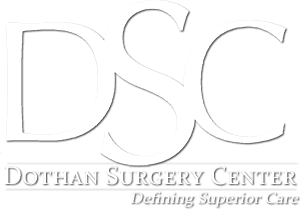Preparing For Surgery
The pre-operative instructions listed below, were developed to assist us in ensuring you receive quality care.
To avoid surgery delays or cancellations, please READ and FOLLOW these instructions carefully.
1. Communication Opt-In
Once your surgeon’s office submits your orders you will receive a text message/ email requesting for you to opt IN to receive further text messages/ email from DSC regarding your surgery to include pre-registration, copay expense, surgery arrival time etc.
2. Pre-Registration
Please preregister as soon as possible AFTER receiving the pre-registration link via text/ email. Your medical history will be reviewed by our Pre-anesthesia department. They may contact you by phone if they have any further questions or need to schedule any other tests prior to the day of your surgery.
3. Completing Your Pre-Registration
It is important that you fill out your pre-registration evaluation with all pertinent information, especially current medications and physicians you are under the care of. Our staff may need to contact those offices for further records for your care.
4. Past Surgery or Anesthesia Complications
It is also important that you inform us of any complications in past surgeries or anesthesia. This will enable us to have an updated medical history and allow us to provide you with knowledgeable care and a quality outcome.
5. Insurance and Payment
Please bring all insurance cards and a picture ID so that we may make a copy for your medical records.
If you have a deductible, co-pay, or if you do not have insurance coverage, payment is due on the day of your surgery.
If necessary, please call us before the date of your surgery to discuss and make financial arrangements.
US
6. Medication Instructions
It is very important that you list all medications during preregistration so that our staff can give you the appropriate medication directions.
-
Do not take diuretics (water pills) the morning of your surgery/ procedure.
-
Follow directions by your physician regarding aspirin and blood thinners prior to your surgery date.
-
Do not take herbal or diet medications two weeks prior to your surgery date.
-
Do take reflux medications on the morning of your surgery with a sip of water.
-
All other medications that need specific instructions will be addressed by our pre-anesthesia staff.
7. Lab Work
We may request that you have lab work prior to your day of surgery.
8. Diabetic Patients
If you are a diabetic, please inform us before the day of your surgery. It is very important that we properly adjust your insulin and monitor your blood sugar. Pre-anesthesia staff will instruct you prior to your surgery date.
9. GLP-1 Medications (Ozempic, Mounjaro, Trulicity, Zepbound, Ryblesus, etc.)
If you are on GLP-1 medications (Ozempic, Mounjaro, Trulicity, Zepbound, Ryblesus, etc.) you MUST make DSC aware. There are specific instructions and if not followed may lead to cancellation/rescheduling of your procedure.
Arrival Time
The staff will notify you the business day before your surgery and provide you with an arrival time.
If you have not received a message from DSC staff the afternoon before your surgery, please call us at 334-793-3442 before 3 PM and an arrival time will be assigned.
Evening Before Your Surgery – This does not apply to GLP-1 patients.
-
Solid food should not be eaten after 10PM the night before surgery.
-
You may drink clear liquids up to two hours before your scheduled arrival time at the Dothan Surgery Center.
Approved clear liquids include:-
Coffee (with or without sweetener, no creamer of any kind)
-
Tea
-
Clear juice (apple)
-
Soft drinks
-
-
Do NOT drink milk, cream, formula, or juices containing pulp (orange, grapefruit, tomato, and prune).
Day of Surgery
-
A responsible adult MUST accompany you to Dothan Surgery Center and be available to receive discharge instructions and drive you home.
-
You will also need an adult to care for you for the first 24 hours following your procedure.
-
Metal objects should not be worn during your surgery. Leave jewelry, body rings, hair clips, etc., at home.
-
If your surgery is scheduled for any area above the shoulders, do not wear make-up or use hair products.
After Your Surgery
Most healthcare facilities discharge patients as soon as they are stable. This means no heart rate or blood pressure concerns, no severe pain, nausea, or bleeding, and the ability to breathe without help. This does not mean awake and alert.
The medicines that prevent or reduce pain and nausea cause sedation/sleepiness.
Our goal is to have you without SIGNIFICANT pain or nausea.
Expect to leave the facility less than alert and possibly quite sleepy.
